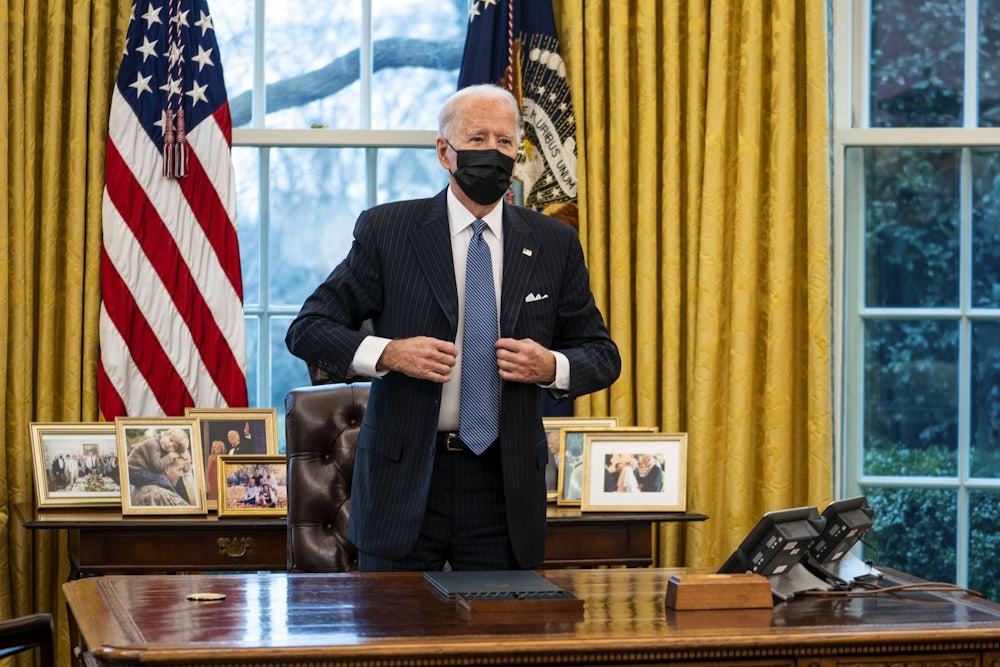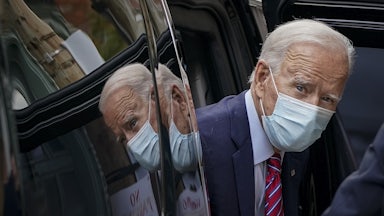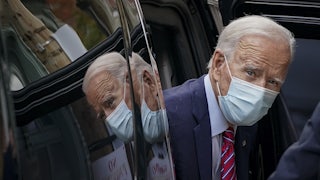After a somewhat obscure court filing in an anti-LGBTQ discrimination case, reported Tuesday by The Washington Post, the Biden administration is now facing serious doubts about how far it is willing to go in the fight for LGBTQ rights. The filing doesn’t get into the facts or merits of the legal challenge, but early readings of its language around shared objectives between anti-LGBTQ religious schools and the administration have left media observers and LGBTQ rights groups trying to glean their arguments from it. And in an administration defined in part by fruitless efforts at compromise, figuring out where Biden stands on religious exemptions and LGBTQ rights is critical right now. What does it mean to compromise with religious groups who assert their “right” to discriminate?
The filing comes as part of a legal challenge, Hunter v. U.S. Department of Education, including 33 current and past students at Christian universities and colleges that receive federal funding, and which charges that the Department of Education has denied students’ anti-LGBTQ discrimination claims under Title IX. “The U.S. Department of Education is duty-bound by Title IX and the U.S. Constitution to protect sexual and gender minority students at taxpayer-funded colleges and universities, including private and religious educational institutions that receive federal funding,” the complaint states. “The religious exemption to Title IX, however, seemingly permits the Department to breach its duty as to the more than 100,000 sexual and gender minority students attending religious colleges and universities where discrimination on the basis of sexual orientation and gender identity is codified in campus policies and openly practiced.” It was filed in March 2021—after Biden took office, amid debate over the Equality Act, sweeping federal legislation prohibiting discrimination on the basis of sex, gender identity, and sexual orientation. A version of the law, passed in the House earlier this year, overrides the Religious Freedom Restoration Act, a 1993 law that anchors many of the exemptions religious institutions presently use to work around anti-discrimination law.
Republicans and anti-LGBTQ groups had seized on the question of religious exemptions, as well as escalating panic about trans youth, to thwart the Equality Act’s progress in Congress. The House passed the Equality Act, and Biden says he supports the legislation, but its fate is uncertain, particularly given the platitudes to bipartisanship offered by Democrats. There is a real possibility that the Equality Act could be lost in debates over how to “compromise” with legislators—by including religious exemptions—whose claim to protect “religious freedom” really means the freedom to discriminate. “Many mainstream LGBTQ groups aren’t committed to fighting,” said Paul Carlos Southwick, director of the Religious Exemption Accountability Project, or REAP, when the group filed the students’ suit in March. “We want to say: ‘Don’t negotiate us away.’ Don’t bargain away these students, who are really being damaged with taxpayer money. I’m worried they will be cut out of the Equality Act protection through negotiations.”
Of 600 four-year, degree-granting nonprofit Christian colleges in the United States, according to REAP, one-third have anti-LGBTQ policies targeting students’ conduct—and those schools receive around $4.2 million in federal funding. Even at these schools, there are still LGBTQ students—people on campus may just not know. More than 10 percent of students who attend Christian colleges and universities do not identify as heterosexual, according to a survey commissioned by REAP, and about 2 percent identified as “either non-binary, genderqueer, agender, transgender, or non-cisgender.” But one in five of all of these students, whom REAP collectively described as “sexual and gender minorities,” have not shared how they identify with anyone. These schools can retain their federal funding, even if, as at Baylor University, according to the legal challenge, they can encourage their students “‘struggling’ with same-sex attraction to attend [their] counseling center,” or, as at Nyack College, they can reject students’ admission when they learn an applicant is transgender and their board of trustees say they “believe in ‘male and female.’”
The Department of Justice, on behalf of the Department of Education, has yet to respond to the students’ complaint, and a response is not due until June 21. The filing this week, then, offers a preview of where the Biden administration stands, albeit a fairly limited one. In essence, the DOJ argued that it is too soon to say how it will make its case but that it believes it can do it without the Christian colleges trying to intervene.
The Council on Christian Colleges and Universities filed a motion in May to join the legal challenge, alleging that the Department of Education would not adequately defend its interests. The Justice Department responded this week in an opposing filing, claiming that the CCCU failed to show that inadequacy. Citing a Ninth Circuit ruling in another case, the DOJ argued that the defendants—the DOE—and the “proposed intervenors”—the CCCU—share, in the words of the Ninth Circuit, the same “ultimate objective,” even if the Biden administration has made statements in support of LGBTQ rights. That shared “objective”—to defend the religious exception—puts the Biden administration on the side of permitting schools to engage in the forms of discrimination the students laid out in their suit.
To be fair, the Biden administration and some LGBTQ rights supporters may very well be sharing a question right now: How do you square the supportive statements about championing LGBTQ rights with the Biden administration’s response to this legal challenge over religious colleges and universities that want to maintain their right to discriminate? In its filing, the Justice Department argued that the Biden administration’s pro-LGBTQ statements aren’t specific to the question of the religious exemption in Title IX, and so the CCCU “can only speculate that the Federal Defendants will back away from a full defense of the Religious Exemption and its challenged application.” Ultimately, the Justice Department rejected the claim that it “will not defend the Religious Exemption as vigorously as Religious Schools,” as one of the proposed intervenors, Western Baptist College, phrased it in its motion, and as DOJ quoted it in its opposition.
This legal maneuvering itself, whatever is behind it inside the Justice Department, has sparked fears and condemnation—what happened to the Biden claim to trans people in the U.S. that “your president has your back”? And how will this ruling bear out when the legal challenge itself is actually argued? This filing, as REAP’s Southwick told the Post this week, “will make our case harder if the federal government plans to vigorously defend it like they have indicated.”
Still, it is hard to say with confidence where the Biden administration falls right now. After stories reporting that the DOJ says it will “vigorously” defend—Western Baptist College’s language—the religious exemption, and that it shares an “ultimate objective”—the Ninth Circuit’s language—with the groups defending the religious exemption, it appears it may be wavering. What feels safe to bet on, however, is a fight. Just as the Biden administration has fallen back on campaign promises to protect the rights of refugees, to end private prisons and address abuses at ICE detention centers, and to confront climate change, why believe LGBTQ rights will be any different? And when the White House goes up in rainbow lights later this month, what does it even mean, if it ever did mean much?








